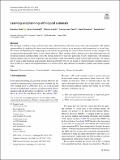Learning and planning with logical automata
Author(s)
Araki, Brandon; Vodrahalli, Kiran; Leech, Thomas; Vasile, Cristian-Ioan; Donahue, Mark; Rus, Daniela; ... Show more Show less
Download10514_2021_Article_9993.pdf (2.588Mb)
Publisher with Creative Commons License
Publisher with Creative Commons License
Creative Commons Attribution
Terms of use
Metadata
Show full item recordAbstract
Abstract
We introduce a method to learn policies from expert demonstrations that are interpretable and manipulable. We achieve interpretability by modeling the interactions between high-level actions as an automaton with connections to formal logic. We achieve manipulability by integrating this automaton into planning via Logical Value Iteration, so that changes to the automaton have predictable effects on the learned behavior. These qualities allow a human user to first understand what the model has learned, and then either correct the learned behavior or zero-shot generalize to new, similar tasks. Our inference method requires only low-level trajectories and a description of the environment in order to learn high-level rules. We achieve this by using a deep Bayesian nonparametric hierarchical model. We test our model on several domains of interest and also show results for a real-world implementation on a mobile robotic arm platform for lunchbox-packing and cabinet-opening tasks.
Date issued
2021-08-13Department
Massachusetts Institute of Technology. Computer Science and Artificial Intelligence Laboratory; Lincoln LaboratoryPublisher
Springer US
Citation
Araki, Brandon, Vodrahalli, Kiran, Leech, Thomas, Vasile, Cristian-Ioan, Donahue, Mark et al. 2021. "Learning and planning with logical automata."
Version: Final published version